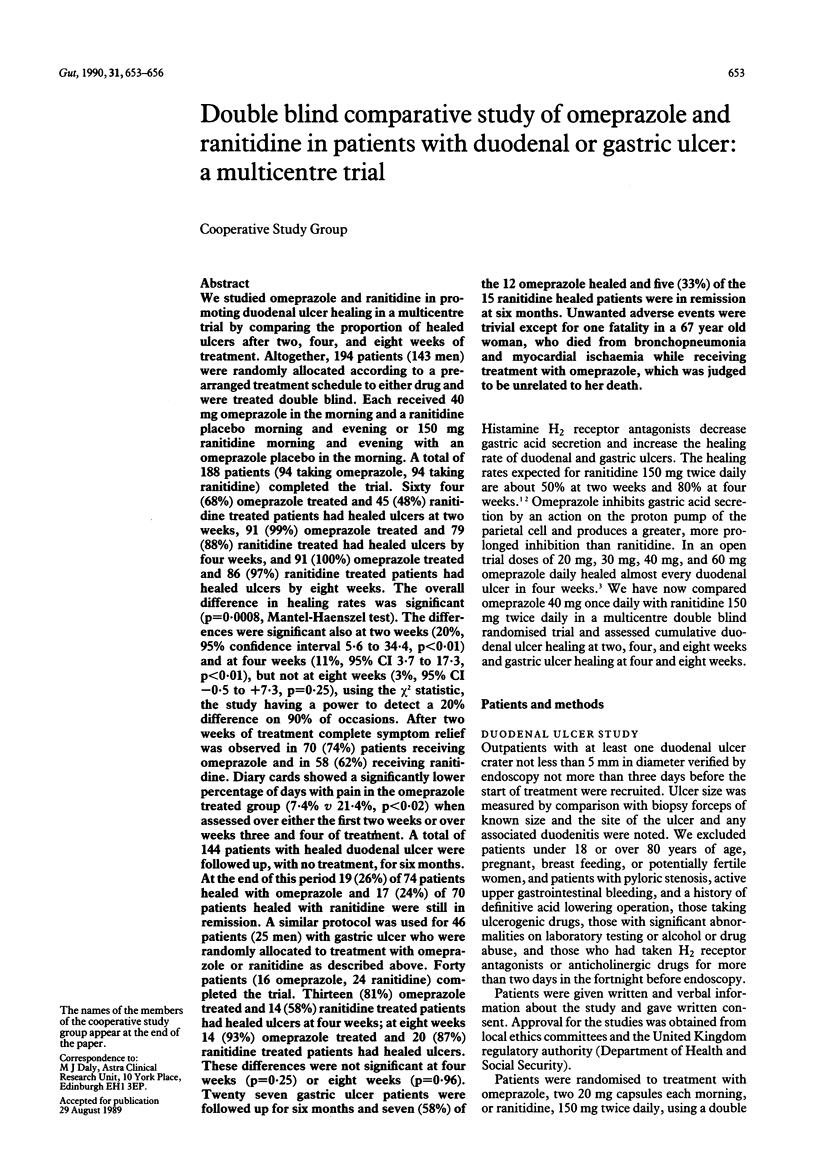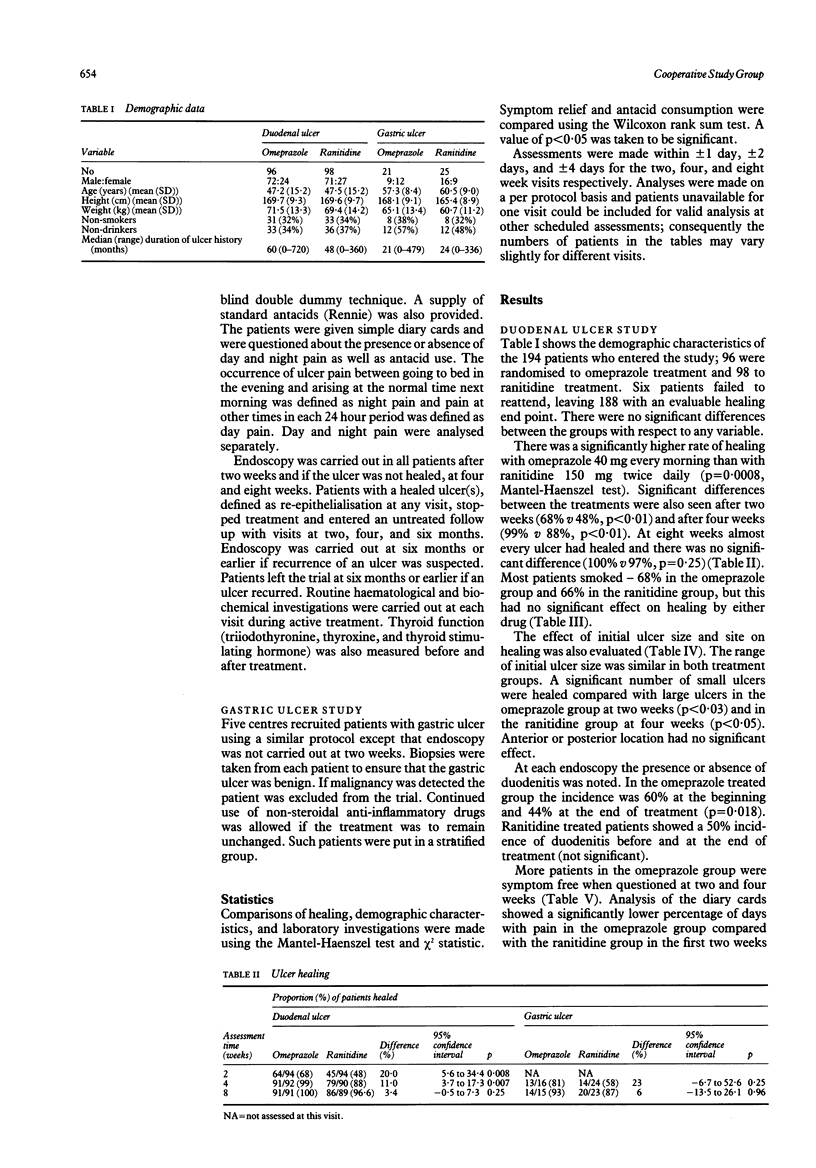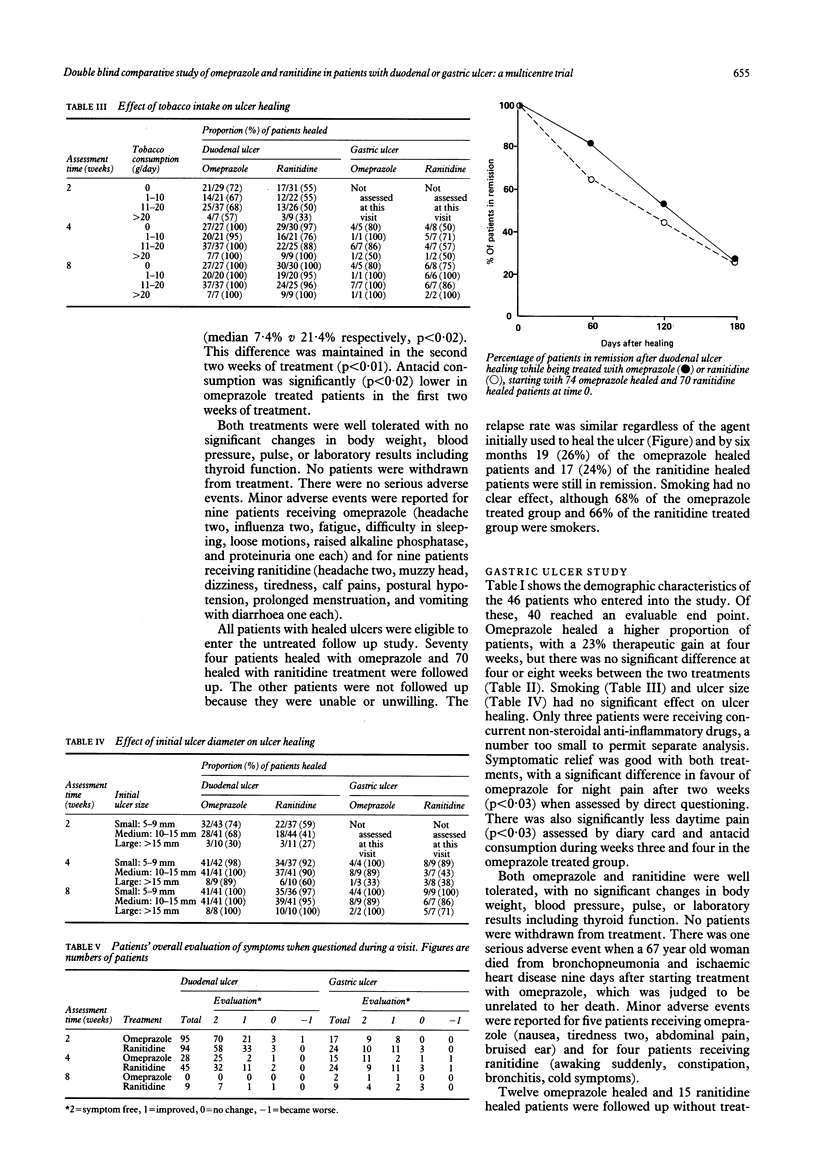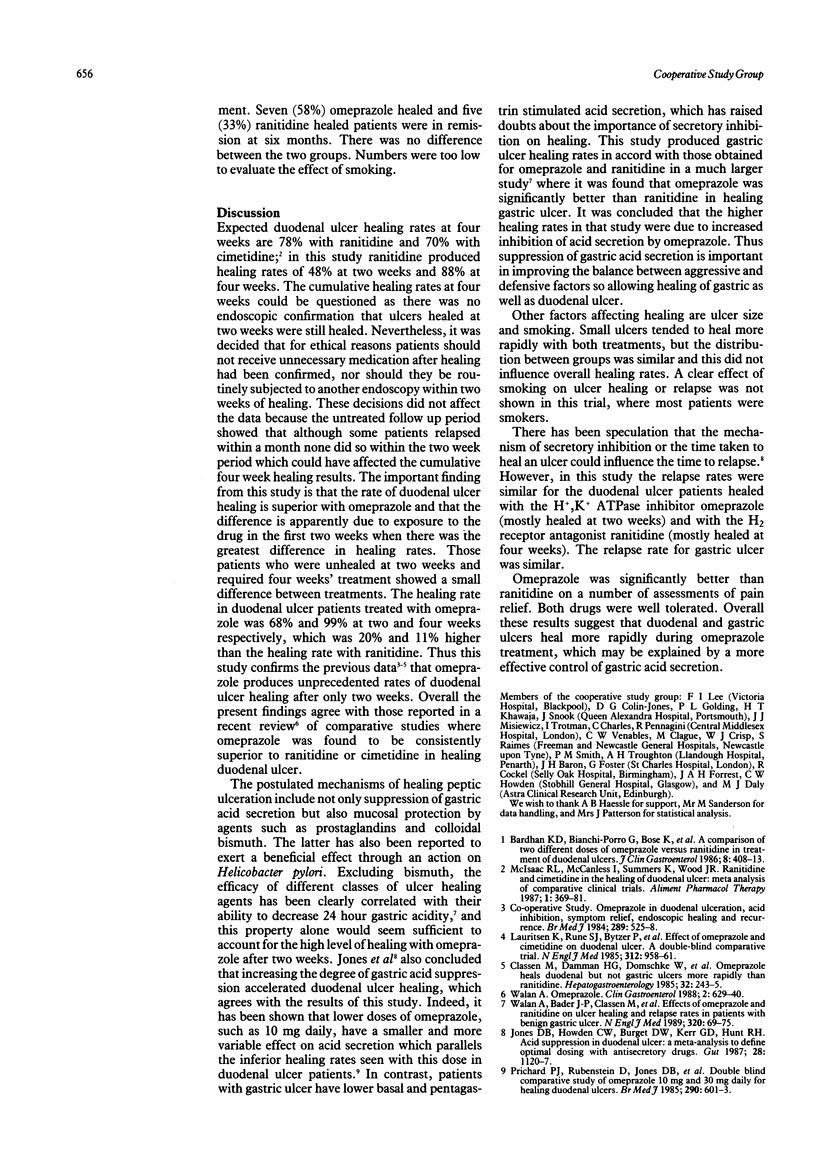Abstract
We studied omeprazole and ranitidine in promoting duodenal ulcer healing in a multicentre trial by comparing the proportion of healed ulcers after two, four, and eight weeks of treatment. Altogether, 194 patients (143 men) were randomly allocated according to a prearranged treatment schedule to either drug and were treated double blind. Each received 40 mg omeprazole in the morning and a ranitidine placebo morning and evening or 150 mg ranitidine morning and evening with an omeprazole placebo in the morning. A total of 188 patients (94 taking omeprazole, 94 taking ranitidine) completed the trial. Sixty four (68%) omeprazole treated and 45 (48%) ranitidine treated patients had healed ulcers at two weeks, 91 (99%) omeprazole treated and 79 (88%) ranitidine treated had healed ulcers by four weeks, and 91 (100%) omeprazole treated and 86 (97%) ranitidine treated patients had healed ulcers by eight weeks. The overall difference in healing rates was significant (p = 0.0008, Mantel-Haenszel test). The differences were significant also at two weeks (20%, 95% confidence interval 5.6 to 34.4, p less than 0.01) and at four weeks (11%, 95% CI 3.7 to 17.3, p less than 0.01), but not at eight weeks (3%, 95% CI -0.5 to + 7.3, p = 0.25), using the chi 2 statistic, the study having a power to detect a 20% difference on 90% of occasions. After two weeks of treatment complete symptom relief was observed in 70 (74%) patients receiving omeprazole and in 58 (62%) receiving ranitidine. Diary cards showed a significantly lower percentage of days with pain in the omeprazole treated group (7.4% v 21.4%, p < 0.02) when assessed over either the first two weeks or over weeks three and four treatment. A total of 144 patients with healed duodenal ulcer were followed up, with no treatment, for six months. At the end of this period 19 (26%) of 74 patients healed with omeprazole and 17 (24%) of 70 patients healed with ranitidine were still in remission. A similar protocol was used for 46 patients (25 men) with gastric ulcer who were randomly allocated to treatment with omeprazole or ranitidine as described above. Forty patients (16 omeprazole, 24 ranitidine) completed trial. Thirteen (81%) omeprazole treated and 14 (58%) ranitidine treated patients had healed ulcers at four weeks; at eight weeks 14 (93%) omeprazole treated and 20 (87%) ranitidine treated patients had healed ulcers. These differences were not significant at four weeks (p = 0.25) or eight weeks (p = 0.96). Twenty seven gastric ulcer patients were followed up for six months and seven (58%) of the 12 omeprazole healed and five (33%) of the 15 ranitidine healed patients were in remission at six months. Unwanted adverse events were trivial except for one fatality in a 67 year old women, who died from bronchopneumonia and myocardial ischaemia while receiving treatment with omeprazole, which was judged to be unrelated to her death.
Full text
PDF



Selected References
These references are in PubMed. This may not be the complete list of references from this article.
- Bardhan K. D., Bianchi Porro G., Bose K., Daly M., Hinchliffe R. F., Jonsson E., Lazzaroni M., Naesdal J., Rikner L., Walan A. A comparison of two different doses of omeprazole versus ranitidine in treatment of duodenal ulcers. J Clin Gastroenterol. 1986 Aug;8(4):408–413. doi: 10.1097/00004836-198608000-00005. [DOI] [PubMed] [Google Scholar]
- Classen M., Dammann H. G., Domschke W., Hüttemann W., Londong W., Rehner M., Simon B., Witzel L., Berger J. Omeprazole heals duodenal, but not gastric ulcers more rapidly than ranitidine. Results of two German multicentre trials. Hepatogastroenterology. 1985 Oct;32(5):243–245. [PubMed] [Google Scholar]
- Lauritsen K., Rune S. J., Bytzer P., Kelbaek H., Jensen K. G., Rask-Madsen J., Bendtsen F., Linde J., Højlund M., Andersen H. H. Effect of omeprazole and cimetidine on duodenal ulcer. A double-blind comparative trial. N Engl J Med. 1985 Apr 11;312(15):958–961. doi: 10.1056/NEJM198504113121505. [DOI] [PubMed] [Google Scholar]
- McIsaac R. L., McCanless I., Summers K., Wood J. R. Ranitidine and cimetidine in the healing of duodenal ulcer: meta-analysis of comparative clinical trials. Aliment Pharmacol Ther. 1987 Oct;1(5):369–381. doi: 10.1111/j.1365-2036.1987.tb00637.x. [DOI] [PubMed] [Google Scholar]
- Prichard P. J., Rubinstein D., Jones D. B., Dudley F. J., Smallwood R. A., Louis W. J., Yeomans N. D. Double blind comparative study of omeprazole 10 mg and 30 mg daily for healing duodenal ulcers. Br Med J (Clin Res Ed) 1985 Feb 23;290(6468):601–603. doi: 10.1136/bmj.290.6468.601. [DOI] [PMC free article] [PubMed] [Google Scholar]
- Walan A., Bader J. P., Classen M., Lamers C. B., Piper D. W., Rutgersson K., Eriksson S. Effect of omeprazole and ranitidine on ulcer healing and relapse rates in patients with benign gastric ulcer. N Engl J Med. 1989 Jan 12;320(2):69–75. doi: 10.1056/NEJM198901123200201. [DOI] [PubMed] [Google Scholar]
- Walan A. Omeprazole. Baillieres Clin Gastroenterol. 1988 Jul;2(3):629–640. doi: 10.1016/s0950-3528(88)80010-1. [DOI] [PubMed] [Google Scholar]


